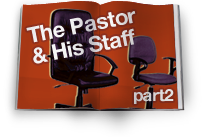Blessings and Trials of Short-Term Staff
It may seem intuitively obvious that long-term church staff are better than short-term staff for administrative and even pastoral work. Indeed, there are disadvantages to short-term staff. But there are also some distinct blessings that come with deliberately hiring for the short-term.
Let me back up first. Many churches throughout history and around the world today exist with no paid staff. Not every church can afford it. Why do churches then have staff? The New Testament makes it clear that, as they are able, churches should pay their primary teachers (Luke 10:7, 1 Cor. 9:14, Gal. 6:6, 1 Thess. 2:6, 1 Tim. 5:17). If a congregation is large enough, it may even be able to support other individuals to serve the ministry of the church. Such additional staff could conceivably do everything from children’s ministry to administration to local outreach to anything in between.
Along these lines, it may seem obviously desirable for such staff to serve for reasonably long stretches of time, and my own church does have some longer-term senior staff (called associate pastors). Long term staff
- provide a church with a sense of stability;
- accumulate broad and deep institutional knowledge;
- build strong and deep relationships;
- learn well the strengths and weaknesses of the body;
- grow in faith as they witness God changing people over long stretches of time;
- accumulate the personal capital and trust necessary for giving meaningful criticism and encouragement when it’s required for fellow staff and church members;
- and more.
Still, in spite of all this, our church has chosen to have a number of staff positions that are deliberately short-term. These are individuals—often young men—whom we hire for one to seven years for doing administrative and even pastoral work for us (called pastoral assistants and assistant pastors). Our intention is for them is to spend some time with us and then move on—some to seminary, some right into other pastorates.
And yes, this brings its share of trials—really, the opposite of the bullet points above. In the hand-over from one staff to the next, matters are forgotten, files are lost, the hard work of training has to start all over, institutional and pastoral knowledge walks out. Even more painfully, relationships end. Coming and going is emotionally wearing.
Yet there are clear benefits. First, fresh ideas come with fresh people, especially if they’re encouraged to share honestly and openly. They come with their own experience of God’s grace in how they were converted. They come with lessons learned in other churches. They come with what God has taught them was spiritually beneficial in the past. All this will benefit your church’s ministry.
Second, new members of the staff have fresh eyes for your church’s situation. Even if they have already been a part of your congregation, their entrance onto the staff can change their perspective.
Third, bringing young individuals onto staff for several years invests in them and, what’s more, invests in the churches they will one day serve. It helps them to imbibe your understanding of God’s Word and God’s church, as well as the culture of your congregation and staff. A few years on a careful church staff can teach things that no years of classroom training ever can. Besides this, it gives these individuals the opportunity to build relationships with other staff.
Fourth, short-term staff do real ministry and real work, both in the lives of church members and in the pastoral staff supported by their administrative work.
In all these ways, short-term staff can be very valuable.
Part of the equation for figuring out how serviceable short-term staff can be for your church is considering how transient your congregation is. The more transient your congregation is, the lower the relational cost to relying on short-term staff.
In our church, anyone who has been a member for even three years is an old-timer. We take in enough members every other month to quickly give any new staff member a host of new faces to care for. What’s “short-term” to a twenty-year member doesn’t look “short-term” to the people who just joined. To them, the one-year old staff member looks as permanent as the parking lot.
Short-term staff are a blessing from God. They should be used for his glory and their own good, as well as for the good of other congregations they may yet serve.









